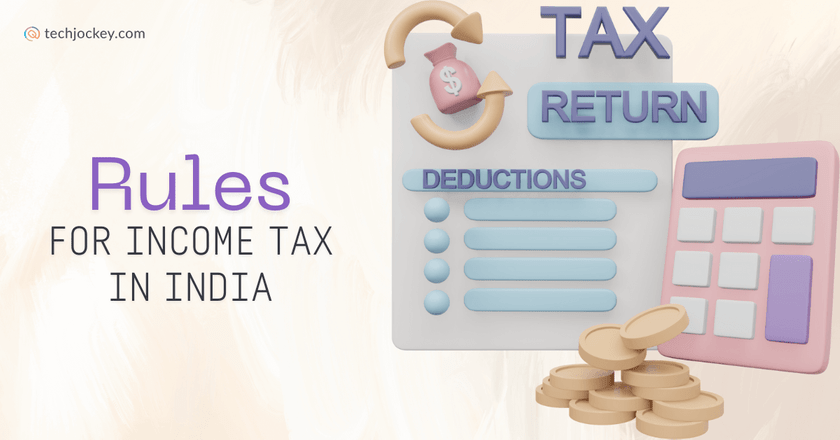Breaking Down the New Rules for Income Tax in India 2025

Taxes. The word alone can make even the calmest person break into a cold sweat. But guess what? The rules for income tax in India don’t have to be a brain-buster! With the new income tax law stirring the pot and fresh income tax return rules popping up out of nowhere, it’s time to put on your detective hat and crack the code.
We will help you do just that with simple tips and clever hacks. Whether you are new to the tax game or just looking to level up, this guide will make you feel like a tax wizard, not a stressed-out mess. Ready to slay the ITR filing? Let’s go!
All the Important Rules for Income Tax in India
In India, the rules for income tax are governed by the Income Tax Act, 1961, but from 2025 onwards, the new income tax law will gradually come into play. The income tax laws and rules set the framework that applies to everyone, from salaried employees to freelancers, traders, and businesses.
Rule #1: Know the New Tax Regime Rules vs the Old Tax Regime Rules
India’s tax system underwent a major overhaul with the introduction of the new tax regime rules. The government now offers taxpayers the option to choose between…
- The Old Tax Regime, which lets you claim multiple deductions and exemptions like 80C, HRA, and standard deduction.
- The New Tax Regime, which offers lower tax slabs but without most deductions.
Here’s a quick peek at the new tax regime rules for FY 2024-25:
| Income Slab | Tax Rate |
|---|---|
| Up to INR 4 lakh | Nil |
| INR 4 lakh – INR 8 lakh | 5% |
| INR 8 lakh – INR 12 lakh | 10% |
| INR 12 lakh – INR 16 lakh | 15% |
| INR 16 lakh – INR 20 lakh | 20% |
| INR 20 lakh – INR 24 lakh | 25% |
| Above INR 24 lakh | 30% |
Here’s what’s hot in the new tax regime…
- Standard deduction of INR 75,000 (raised from INR 50,000)
- Section 87A rebate up to INR 60,000
- Effectively, income up to INR 12.75 lakh is tax-free
- You can still claim employer’s NPS (80CCD(2)) and Agniveer Fund (80CCH)
Tax Hack: Choose the new tax regime rules if you don’t invest heavily in deductions, but old regime if you want to claim exemptions. Salaried with zero deductions? New regime might be your bestie. Heavy investor in LIC, ELSS, home loan interest? Old regime is your jam.

ClearTax Income Tax
Starting Price
Price on Request
Rule #2: Pick the Right ITR Form, It’s More Important Than You Think
One of the most important income tax return file rules is to pick the correct ITR form. Filing under the wrong form can lead to rejected returns or unwanted notices.
Here’s the lowdown on popular ITR forms…
- ITR-1 (Sahaj): For salaried individuals with income from one house property and income up to INR 50 lakh.
- ITR-2: For those with capital gains, foreign income, or multiple house properties.
- ITR-3: For business or profession income (including freelancers).
- ITR-4 (Sugam): For presumptive income under sections 44AD and 44ADA.
Remember, crypto investors and traders cannot file ITR-1 and usually have to file ITR-2 or ITR-3. This is a critical ITR rule many miss!

Saral IncomeTax
Starting Price
₹ 5500.00 excl. GST
Rule #3: Always File Your Return Before the Deadline
Filing your ITR on time is a golden rule in the income tax return rules. The deadline for most taxpayers (not requiring audit) is September 15th following the financial year.
Here are the key ITR deadlines for FY 2024-25…
- September 15, 2025: For individuals not subject to audit.
- October 31, 2025: For taxpayers requiring audit (businesses, professionals).
- December 31, 2025: Last date for belated and revised returns.
Miss these deadlines and you face penalties under Section 234F. Fines can be up to INR 5,000! Plus, late filers lose the ability to carry forward losses, a huge blow under the income tax guidelines.

TaxCloud
Starting Price
₹ 2999.00 excl. GST
Rule #4: Disclose All Your Income, It’s the Best Way to Avoid Trouble
The Indian income tax rules mandate that you must disclose all income earned during the financial year. This includes…
- Salary income
- Rental income
- Capital gains from stocks or property
- Crypto and NFT profits (taxed at flat 30% under the new income tax law)
- Interest income
- Freelance or business income
- Gifts exceeding INR 50,000 from non-relatives
With Form 26AS and AIS statements, the tax department cross-checks your declared income with third-party data. Omitting any income can lead to penalties or audits, so don’t try to cut corners, this is a key income tax return rule!

EasyOFFICE
Starting Price
₹ 2900.00 excl. GST
Rule #5: Claim Eligible Deductions (Old Tax Regime Only!)
Deductions reduce your taxable income, lowering your tax liability. But remember, income tax guidelines say deductions only apply under the old tax regime.
Popular deductions include…
- Section 80C (up to INR 1.5 lakh): PPF, ELSS, LIC, home loan principal, tuition fees
- Section 80D: Health insurance premiums
- Section 80CCD(1B): Additional INR 50,000 for NPS contributions
- Section 24(b): Home loan interest up to INR 2 lakh
- Section 80TTA/80TTB: Savings account interest (INR 10,000 for individuals, INR 50,000 for senior citizens)
Always keep documents handy to substantiate your claims during scrutiny, because the income tax return file rules are strict about documentation.
Tax Planning Tip: Want to invest and save tax? Old regime is your BFF.

CompuTax
Starting Price
Price on Request
Rule #6: Freelancers, Traders, and Businesses Must Follow Special Income Tax Return Rules
If you earn through freelancing, trading, or business, the income tax return file rules are different and more detailed…
- Report gross receipts and expenses honestly.
- Use presumptive taxation schemes (Section 44AD and 44ADA) if eligible for simplified filing.
- ITR-3 or ITR-4 forms are applicable depending on your business type.
- Maintain proper books of accounts and invoices as per Indian income tax rules. From Zomato delivery to YouTube brand deals, keep records for at least 6 years.
Keep in mind that TDS (Tax Deducted at Source) applies on many payments made to freelancers and contractors.
Rule #7: Don’t Just File, Verify Your ITR Within 30 Days
Filing your return is incomplete until you verify it electronically. Verification can be done via…
- Aadhaar OTP
- Net banking
- EVC (Electronic Verification Code) sent to your registered mobile or email
- Demat account verification
Failing to verify means your return isn’t considered valid, and you won’t get your refund. This is a vital income tax return file rule many taxpayers overlook.
Pro Tip: Using income tax software can simplify both filing and e-verification, ensuring you never miss critical steps.
Bonus: Keep Abreast of the New Income Tax Law ITR Updates 2025-26 (And Beyond!)
India is currently in the process of introducing a new income tax law to replace the old 1961 Act. This law will simplify tax provisions, clarify disputes, and introduce features like joint filing for spouses and faster refun
Stay updated with these income tax guidelines through official websites and trusted tax consultants. Early adopters always benefit!
Expected Go-Live: FY 2026-27 (April 2026). The aim? Simpler, digital-first taxation for all.
Conclusion
- Remember these 7 golden rules for income tax…
- Choose your tax regime wisely: old or new.
- Use the correct ITR form based on your income souces
- Never miss filing deadlines to avoid penalties.
- Disclose all your income honestly
- Claim deductions only if using the old regime.
- Follow special return rules if you’re a freelancer, trader, or business owner.
- Verify your return on time to make it valid
When you follow these income tax return rules and stay abreast with the all the necessary ITR updates, filing your ITR becomes a breeze.
FAQs
Can I switch between the old and new tax regime every year?
Yes, salaried taxpayers can choose every year, but businesses have restrictions.
What happens if I miss my ITR filing deadline?
You may have to pay penalties, and some benefilike loss carry forward will be lost.
Are crypto earnings taxable under Indian income tlaws and rules?
Yes, crypto profits are taxed at a flat 30% under the new guidelines.
Yashika Aneja is a Senior Content Writer at Techjockey, with over 5 years of experience in content creation and management. From writing about normal everyday affairs to profound fact-based stories on wide-ranging themes, including environment, technology, education, politics, social media, travel, lifestyle so on and so forth, she... Read more








